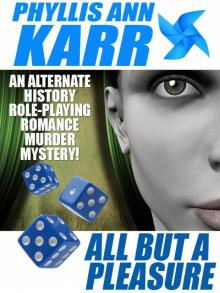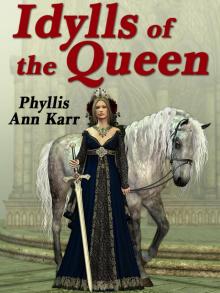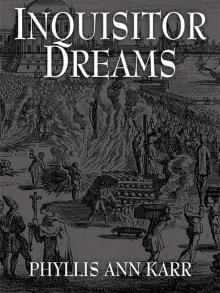- Home
- Phyllis Ann Karr
The Idylls of the Queen Page 18
The Idylls of the Queen Read online
Page 18
Before she touched me, I saw nothing but an ordinary basin of glazed clay filled with water, dark except for the reflection of the nearest lamp’s three flames. Once Morgan’s dry hand was holding mine, the reflection disappeared, the water seemed to glow from within, and the image of the Queen’s fatal dinner appeared on the surface.
It was about halfway over. Gawain was apparently telling Her Grace a humorous tale. She laughed, while Bors, at her other hand, seemed to smile like a man trying not to show faint disapproval. We could only see, not hear them; and the images were so tiny it was hard to read their faces. Unless Dame Morgan could hear them, and had sharper eyes than ours, I could see that this way of gaining information left even more to be desired than she had hinted earlier.
After squinting down at it for a few moments, vainly trying to make out which of the guests or servers might look apprehensive, I wanted to tell Dame Morgan she could just as well pass over about the third part of an hour. But for all I knew, speaking might break the spell. So we kept quiet and watched our tiny images aim silent witticisms at one another and lift invisible bites of meat to mouths that looked scarcely larger when open than when closed. Marvelous or not, leading to tragedy or not, it eventually grew a little tiresome; and I began to admire Dame Morgan’s ability to sit gazing at it so intently. Once I glanced around and noticed that the cat had finished washing itself and come back to Nimue, who was quietly petting it without paying any attention to the images in the water.
At last Coupnez brought the bowl of fruit from the sideboard, knelt awkwardly, and presented it to the Queen. Gawain turned his head. He seemed to be eyeing the fruit greedily, judging which piece he hoped would be left for him; but I understood I might only be reading into his minute image emotions I had seen in him before when he came face to face with his beloved apples. We watched him instruct the page to carry the fruit around first to the other guests, while Bors, the ascetic who would never eat fruit at this season of the year anyway, seemed to nod approval.
I was so busy noticing who accepted fruit and who waved Coupnez on that I missed seeing Patrise take the fatal few bites. A sudden tightened indrawing of Morgan’s breath and a very slight increase of pressure from her fingers told me when she saw Patrise fall. I kept on trying to study the reactions of the other guests. Morgan had apparently understood what was wrong sooner than those of us there present had at the time.
We went on watching our own past until the King had come and gone and the rest of the Queen’s guests were beginning to trail away. Then Morgan dropped our hands and leaned forward a little, closing her eyes and resting her chin in her palms. “So it appears that one of your young knights died of a poisoned apple,” she said, “and you have come seeking me out to charge me with the deed. Do I interpret the images correctly, my lords? Has Sir Mador de la Porte charged Guenevere?”
“Yes,” I said. “It’s the general opinion at court that you’re long dead, or we might have been able to turn the accusation from Her Grace to you.”
“How fortunate you do not know the identities of my poor spies, or you might have racked lying confessions from them and burned them at once.” Morgan stood to face us. Even before learning magic, she had been taller than most women. “I am hardly flattered that any of you should have taken this for my handiwork, my lords. Does it bear the marks of my infamy? Poison hidden in a piece of fruit! Oh, no, good my lords, if I had done this, there would have been no doubt. I would have given you a marvel—a baby basilisk in the apple, or at the very least a bit of orange smoke and green flame. Doubtless I would have made a test of it: Only the unworthiest knight would have been injured, while the rest would eat with impunity. And it would have happened before the full court, not at a small dinner for a mere two dozen. Have I ever struck when the King my brother was not present? Have I ever struck so purposelessly as this, so over-subtly that it could not be recognized at once for my handiwork, or at least for magic, immediately after the deed? Would I have risked my own dearest nephews? My lords, I am ashamed of you for holding me suspect!”
“Maybe you should be ashamed of opening yourself up to our suspicion, Dame,” I said. “So your poor spies hadn’t gotten the news to you yet, eh? When would they have gotten it to you? After the Queen was safely burned?”
“Be careful how you continue to insult my aunt, Seneschal,” said Mordred, “lest she lose her extreme patience and turn you into a toad.”
“Dame Guenevere’s trial is eight days from now,” said Nimue.
“Aye.” Morgan sat again, holding her hands out over the basin as if to still the water. “Play my spies, my lords. Where shall we look now? Shall we follow the apples and pears from their storage pits to your table? Or shall we attempt to follow the actions of possible traitors?”
Mordred asked, “You can, then, choose some person—let us say our friend the seneschal here—and follow him from the death chamber to wherever he went?”
“Aye, although as the person moves from place to place, I must either be able to recognize or guess where that person is going, or to keep watch by overlapping scenes as a tailor overlaps seams. The passage may become longer in the watching than in the original.”
“You see what work we would have to find Sir Lancelot by such means as this,” Nimue said gayly. “If you had a bit of his hair or a scrap of clothing he had worn recently, we could find him as I found Dame Morgan. By the way, I can assure you that Sir Kay is guiltless in this matter, and it would do the rest of us very little good to follow his movements.”
“I had assumed, by the fact of their seeking me out, that both of them were guiltless,” said Morgan, “of this poisoning.”
“Try to follow Coupnez—Doran the Earl of Pase’s son,” I said, and told her, as nearly as I could gauge it, about what time to begin watching the Queen’s antechamber for the page’s arrival.
“You risk much, Seneschal,” said Mordred. “You risk seeing Her Grace envenom the fruit as she arranges it.”
“Damn you, Mordred,” I began, starting to give him back his vile words in rather too loud a voice for the place we were in—but all at once a sort of incredible melancholy struck me, almost as tangible as a lance. It went through my brain that the Queen scorned me, the court despised me, the very servants obeyed me only out of fear and mocked me behind my back. I had not gone on a real quest for years nor fought in a real battle since the war against Claudas of France, I was useless these days in joust and tournament, I had wasted my life in petty duties that would be forgotten while future ages were singing the glory of careless berserkers like Lancelot and Tristram, and nothing I had ever done or was doing now was to any purpose… it was all I could do, for a few moments, to keep from drawing my dagger and plunging it into my heart.
I leaned against the wall and shook my head, aware that the others were watching me and wondering whether to lash out at them and let Le Fay turn me into a toad, or leave them and go throw myself from one of the towers. Then the cloud lifted, and I saw they were looking at me with concern rather than scorn. Nimue, showing the most concern, came forward and touched my shoulder. With an effort, I resisted the temptation to lean forward and sob on her breast.
“Forgive me, Sir Kay,” she said. “I had not meant to strike you quite so hard, but I worked very quickly.”
“What did you do to him, Dame?” Mordred inquired.
“It is a spell of melancholia, of despair. I judged the time had come that you should stop bickering between yourselves.”
“Then why in God’s Name didn’t you strike him?” I said, beginning to recover.
“To what purpose? He had already done his harm. I meant to stop angry words, not to punish them. Besides,” she added softly, for my ears alone, “I know your mind and memory and that you could withstand it, at least for a few moments. I do not know what further mischief it would have done to Mordred. Did you not tell me yourself, two evenings ago, to be tender with him?”
We returned to Morgan, still seated before her b
asin of water with Mordred at her shoulder. “The Queen’s antechamber,” I said, “an hour before dinner, last Monday.”
We saw Guenevere pacing the room, talking to her kinswomen, Dames Lore and Elyzabel. She seemed tense, unquiet—probably worrying about Lancelot and where he had gone this time. Elyzabel opened the door, no doubt in answer to knocking, and took the bags of fruit from old Rozennik’s scullions Torntunic and Wilkin.
“Shall I pass quickly over half an hour?” murmured Le Fay, causing only a faint ripple in the picture.
“No,” I said, catching myself before I could glare at Mordred, “we’ll all watch her innocence.”
With something definite to do, the Queen seemed to become herself, cheerful, calm, capable, wise and witty—the wisest and most gracious woman in the world, except where that fool Lancelot is concerned. She chatted happily with her cousins as she picked and chose among the apples and pears, piling the better ones in their silver dish as carefully as a craftsman. She did not have much room for choice; there were no more than thirty pieces of fruit before her. But she scrutinized each one as if she had fifty to choose among, rejecting three. Elyzabel picked up one of the rejected apples or pears (small as the image was, we could not always see which were which) and began to eat it—I wondered why Dame Lore had forgotten to mention that when she propounded to me on how the poison could not have been in the fruit when the Queen arranged it.
When the dish of fruit was arranged to her satisfaction, the Queen rang her bell. She did not slip back into her restless mood, but began to select jewelry for herself, returning once or twice to make some invisible adjustment to her apples and pears. She had arranged the nuts, too, for her dinner, in the gilt wire frameworks of her own design: peacock, cat, hawk, hare, brachet, boar, and two trees; but she had arranged the nuts earlier and sent them to the small banquet room already.
Coupnez came. Dame Lore put the dish of fruit into his arms. The Queen held up one of the rejected pieces, no doubt promising it to the page when he had completed his errand, and sent him on his way. As Coupnez made his exit from the antechamber, Morgan dropped our hands for a moment and the image vanished.
“She could have inserted poison on a long pin while she was examining the fruit,” said Mordred. This time he at least had the grace to speak cautiously rather than insolently. “We would not have been able to see the pin.”
“We might have been able to see its glint,” I said, restraining my temper. “Besides, that would make both Dame Cupbearer and Dame Elyzabel her accomplices. And she had examined that piece Dame Elyzabel ate just as closely as she examined the ones she put in the dish.”
Dame Morgan took our hands again, and we saw the door to the Queen’s apartment from the other side, the passage side, with Coupnez turning right. We watched until the page began to disappear at the edge of the basin, then Morgan dropped our hands again and picked them up when she had the next several yards of passageway reflected in her mirror.
Le Fay could not have been with the court in London more than a few times, years ago, but she must have remembered the buildings well, for she was able to follow Coupnez without stopping to consult me as to where he would have gone next. True, there is only one place between the Queen’s apartment and the small banquet chamber where the passage divides. The branching happened to come just beyond the edge of the picture, and when Morgan gathered the next image, Coupnez was not there. But he should have been there. Dame Morgan had followed the correct way to the banquet chamber. The other branching led to some little-used stairs to the cellars.
“So that’s where the young scoundrel stopped to waste time, or worse,” I said.
Dame Morgan shifted the image to the other branching. I became aware that this time Dame Nimue was watching with us, looking over our shoulders and lightly touching Morgan’s upper arm.
Coupnez, his gaze fastened greedily on the fruit in his arms, dodged into the less-used passageway. The promise of one piece after his errand had not been enough, because now he awkwardly set down the dish, helped himself to another piece, and rearranged the remaining pears and apples to hide his theft. Then he moved forward several paces, sat on the upper steps, his back to the dish, and began eating.
By my reckoning, Her Grace must have put a few more than twenty-five pieces of fruit into the dish. No doubt she had foreseen this possibility.
We had a side view of the scene, as if one wall of the passage had been lifted away somehow. I suppose Morgan’s magic was tight up against that wall, and the diminished proportions accounted somehow for the long view we seemed to have from end to end. As Coupnez sat munching, no doubt deaf to any sound beyond the fruit in his cheeks, a clerkly figure entered behind him.
The newcomer was in long white robes, with cowl pulled far down over his face. He stopped a few paces from the dish of fruit, genuflected, and crossed himself. Still kneeling, he pulled a holy-water sprinkler from his robes and sprinkled the fruit thoroughly, making the Sign of the Cross over it as if in blessing. Then he rose, turned, and took his departure. The page never turned his head. The cleric could not have made enough noise to carry over the sound of Coupnez’ own crunching.
Dame Morgan sighed and dropped our hands. “Am I absolved, good my lords?”
CHAPTER 23
The Way of the Tortoise Is Sometimes Inadequate
“But Sir Gawaine had a custom that he used daily at dinner and at supper, that he loved well all manner of fruit, and in especial apples and pears. And therefore, whosomever dined or feasted Sir Gawaine would commonly purvey for good fruit for him…”
—Malory XVIII, 3
“That could have been one of your spies, Aunt, acting on your orders,” said Mordred. “Or, indeed, it could be a mere lie of your own making that you have shown us.”
“Had Sir Kay been the one to tell me that, Nephew, you would have threatened him, on my behalf, with being turned into a toad at my hand.”
They said that or something like it; for a moment I was only half-listening to their family banter. “That young Satan!” I exclaimed. “He could have come forward and told the court there was no poison in the fruit when he took the bowl from Her Grace!”
“Fear, Seneschal,” said Mordred. “Doran Coupnez is scarcely eight summers old.”
“Fear of being punished for stealing an apple? By God, the punishment he would have got for that is nothing to what he’ll get for not telling what he knew and—”
“What did he know?” said Mordred quietly. “Only that the piece of fruit he stole had not been poisoned. What might he fear? Being charged himself, and burned in the Queen’s place, or at her side.”
“We ourselves do not know that this was the poisoner,” said Nimue. “It might have been only what Doran would have seen had he turned: an over-zealous priest stopping to bless a bowl of fruit.”
I snorted. “We have too many clerics and not enough work for them if all they can find to do is wander about the passages looking for stray dishes of food to bless. If he were only a pure-hearted, simple-minded priest, why not bless Coupnez, too?”
“Yes,” said Morgan, “this cleric seemed very careful not to sprinkle the child. Still, we do not know but that something further took place between those stairs and the banquet chamber. Do you trust me to continue, my lords?”
If Dame Morgan were manufacturing the images, she could have shown us Guenevere poisoning the fruit; and if the cleric had been one of her own creatures, she need not have shown us the scene at all. “I trust you far enough to watch what you have to show us,” I said.
“We will begin with what we have just seen,” she replied. “You will know, at least, that I omit nothing.”
She brought us back to the scene at the stairs. We watched the clerkly figure go through its sneaking mummery once more and leave. Coupnez finally finished his piece of fruit, jumped up guiltily, as if in sudden fear that someone would notice how long he had taken on his errand, got his arms around the dish, staggered up from his knees to his
feet and hurried back to the main passage, almost overbalancing. Scene by scene, we followed him the rest of the way to the small banquet chamber. Although one step through the passageways is much like all the others, Morgan did not seem to leave any inch of Coupnez’ journey unscrutinized. For good measure, we watched the fruit sit on the sideboard from the time Coupnez left it there, with several servants busy in the chamber the whole time, until the dinner was nearing its end and the page brought the dish from the sideboard to Her Grace’s table, as we had seen before. There was no other time the poison could have gotten into the fruit.
“But the man may still have been a mere silly, harmless priest,” said Mordred. “The poison may have been inserted sometime previously, in one or a few pieces only, and Doran Coupnez been fortunate in choosing one of the unpoisoned pieces.”
“For Ihesu’s sake, Mordred, stop playing Devil’s advocate,” I said. “Even you can’t really believe Her Grace would poison one or two apples on a random whim.”
“One thrust of a pin, unseen by her cousins, into one apple so marked that she herself might recognize it again and guide it into the right hand… but we can never know, can we, whether all the fruit was venomed or only one or two pieces? Thanks to the Queen’s actions, and yours, and brother Gawain’s.”
“In my opinion, Dame of the Lake,” I said, “you may touch him with your melancholia spell whenever you please.”
Mordred smiled. “I schooled myself long ago in how to fight the demons of melancholia and survive. But how would such a poison be obtained, Aunt, assuming it was indeed in the priest’s aspergillum? Could any person with knowledge of herbs and substances prepare it, or would it require knowledge of the deeper lore and the aid of devils?”
Morgan bent her head forward, rubbing her fingers through the silvering hair at her temples. “There are many poisons that can be sprinkled upon food. This did not, as far as we could see and at least for a short time, tarnish or discolor the aspergillum, nor did any of you notice marks on the silver dish. It might have sunk into the meat at once, leaving the skin of the fruit relatively safe; although, since no one seems to have handled it further until its passing around and the death of Sir Patrise—after which all took care to clean their own hands and avoid consuming anything else—this point seems of lesser importance. It killed almost at once, and blood came up from the victim’s mouth… that poor young man! He was new to your company, I think? To gain almost the height of your world’s ambition—a place at Arthur’s Round Table—and then to die so!”

 The Gallows in the Greenwood
The Gallows in the Greenwood At Amberleaf Fair
At Amberleaf Fair Frostflower and Thorn
Frostflower and Thorn The Fanciers & Realizers MEGAPACK
The Fanciers & Realizers MEGAPACK All But a Pleasure
All But a Pleasure The Idylls of the Queen
The Idylls of the Queen Frostflower and Windbourne (Frostflower & Thorn)
Frostflower and Windbourne (Frostflower & Thorn) Inquisitor Dreams
Inquisitor Dreams